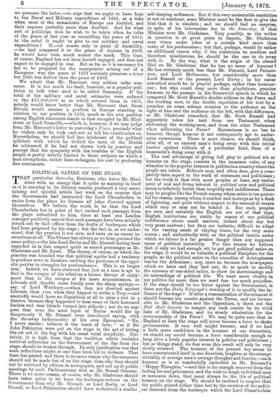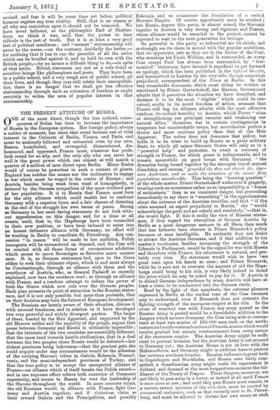POLITICAL SATIRE ON THE STAGE.
THAT particular Saturday Reviewer, who hates Mr. Glad- stone with an energy that is quite as amusing in itself as it is amusing in its literary results, produced a very enter- taining and spiteful article last week on the rumour that the Government had instructed the Lord Chamberlain to excise from the plays he licenses all jokes directed against themselves. We believe the truth to be that the Lord Chamberlain has in point of fact excised such passages from the plays submitted to him, since at least one London manager positively asserts that such passages have been actually struck out by that officer from the drafts of burlesques which had been prepared for his stage ; but the fact is, as we under- stand, that the practice is not new, and rests on no recent in- structions at all. The Censor has always, as we hear, pursued the same policy,—the late Lord Derby and Mr. Disraeli having been regarded as in this respect quite as sacred personages as Mr. Gladstone and Mr. Lowe. The theory, of course, on which the practice was founded was that political squibs had a tendency to produce rows in theatres, exciting the partizans of the oppo- site parties to struggles for predominance. This is no longer true. Indeed, we have observed that just as a man is apt to find in the scrapes of his relatives a keener flavour of enjoy- ment than in the scrapes of his mere acquaintances, so Liberals will chuckle more fondly over the sharp sayings,— say, of Lord Westbury,—when they are directed against Liberals, than even when they happen to strike a Tory,—and assuredly would have no disposition at all to raise a riot in a theatre, because they happened to hear some of their honoured leaders and dear friends turned into ridicule ; nor do we sup- pose that even the most loyal of Tories would fire up dangerously if Mr. Disraeli were introduced saying, with the die-away lachrymosity of his own Egremont, " No, I never smoke ; tobacco is the tomb of love ; " or if Sir John Pakington were put on the stage in the act of letting the cat out of the bag with his usual rural simplicity. Cer- tainly, it is high time that the tradition which excludes satirical reflections on the Government of the day from the stage, should be broken through. Its only justification was that such reflections might at one time have led to violence. That time has passed, and there is no more reason why Governments should not be made fun of on the stage, than why they should not be satirized by editors in newspapers, and cut up at public meetings by such Parliamentary wits as Mr. Bernal Osborne. There is no more reason, of coarse, why Mr. Gladstone should have taken pains to let loose the burlesque-writers on the Government than why Mr. Disraeli, or Lord Derby, or Lord Russell, or Lord Palmerston should have authorized a similar self-denying ordinance. But if this very undesirable restriction is not to continue, some Minister must be the first to give the hint that it is obsolete ; and we should feel no surprise, in spite of his internecine foe in the Saturday, if that Minister were Mr. Gladstone. Very possibly, as the writer in question is at great pains to impute, Mr. Gladstone may wince under jokes of a certain kind more than many of his predecessors ; but that, perhaps, would be rather an additional reason why, if the restriction be needless and therefore mischievous, he should be the one to do away with it. By the way, what is the origin of the absurd libel on Mr. Gladstone that he has no sense of humour He has certainly much less than Mr. Disraeli, Lord Palmer- ston, and Lord Melbourne, but considerably more than Lord Russell or the present Lord Derby ; in his easier oratorical moods he is playful perhaps, rather than humour- Gus ; but who could deny more than playfulness, genuine humour, to the passage in his Greenwich speech in which he compared Mr. Scott Russell's double address to the Peers and the working men, to the double repetition of his text by a preacher on some solemn occasion to the audience on the right of him and the audience on the left, with this difference, as Mr. Gladstone remarked, that Mr. Scott Russell had apparently taken his text from one Testament when addressing the working-men, and from the other Testament when addressing the Peers / Earnestness is no bar to humour, though humour is not unfrequently apt to under- mine earnestness. There is more chance, we should think, after all, of an earnest man's doing away with this trivial barrier against ridicule of a particular kind, than of a humourist's doing away with it.
The real advantage of giving full play to political wit or humour on the stage, consists in the immense value of any stimulus to thepopular interest in politics in a country where the people are rulers. Ridicule may, and often does, give a com- pletely false aspect to the work of statesmen and politicians ; but the truth is that with most peoples at least, any excite- ment of real and living interest in political men and political issues is infinitely better than torpidity and indifference. There may be peoples like the French among whom satire is too power- ful for reason, among whom it scathes and destroys as by a flash of lightning, and quite without respect to the amount of reason which may or may not be behind it. But such peoples are rare, and certainly the English are not of that type. English institutions are stable by reason of our political indifference about small matters, indeed about any but very great matters ; but they are inelastic, difficult to adapt to the varying needs of varying times, for the very same reason ; and undoubtedly with us the political inertia under which we labour is a far greater danger then any supposed cause of political instability. For this reason we believe that if only we had enough wit to get good political satire on the stage, it would be as valuable a political discipline for the people, as the political satire in the comedies of Aristophanes was for the Athenians ; nay, more so, because the newspapers which we have and they had not, do so much to modify the excesses of one-sided satire, to show its shortcomings and its misreadings of political life. We want more vitality in our politics far more than we need fear too much prejudice. If the stage should be too bitter against the Government, is there not the Daily Telegraph's worship of it to modify the in- fluence of the stage ? If after a transmutation of Government it should become too caustic against the Tories, and too favour- able to Mr. Gladstone and the Opposition, is there not the Pall Mall Gazette to temper any such results by its vivid hate of Mr. Gladstone, and its steady admiration for the statesmanship of the Peers ? We may be quite sure that in England at least the stage will never become a force to shake governments. It very well might become, and if we had a little more confidence in the humour of our dramatists, we should say would become, a force considerable enough to keep alive a lively popular interest in politics and politicians ; but as things stand, we fear even this result will only be very slowly attained. The humour of the present day seems to have concentrated itself in one direction, laughter at the strange triviality of average men's average thoughts and fancies,—such humour as is so wonderfully embodied in Mr. Burnand's " Happy Thoughts,"--and this is far enough removed from the feeling for real grievances, and the wish to laugh individual men or measures down, that must always be the life of political humour on the stage. We should be inclined to suspect that the public gained rather than lost by the excision of the politi- cal elements from the burlesque which the Lord Chamberlain
revised, and fear it will be some time yet before political humour regains any true vitality. Still, that is no reason at all why any restriction upon it should not be removed. We have never believed, as the philosophic Earl of Shaftes- bury, we think it was, said, that the power to bear ridicule is the test of truth. But it is at least a very good test of political manliness ; and " earnest " statesmanship will never be the worse,—on the contrary, decidedly the better,— for realizing that it has to run the gauntlet of all the satire which can be levelled against it, and to hold its own with the British people,—by no means a difficult thing to do,—in spite of that satire. British statesmen are not as a rule timid or sensitive beings like philosophers and poets. They have been in a public school, and a very rough sort of public school, all their lives, and though they may still retain their susceptibili- ties, there is no danger that we shall get less effective statesmanship through such an extension of freedom as ought certainly to widen the area of popular interest in that statesmanship.











































 Previous page
Previous page